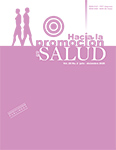Authors
Abstract
Objective: To train an interdisciplinary group of undergraduate students as university health promoters and evaluate their results. Methodology: Participatory action research with 13 undergraduate students of the Pontificia Universidad Católica de Ecuador during the period 2012-2014. The process was developed in four phases: 1) training in health promotion of the group; 2) diagnosis of the general health situation of the students; 3) design, planning and implementation of a project executed by trained students; and 4) evaluation of the intervention. Qualitative and quantitative techniques were applied in each phase for the diagnosis and evaluation of results. Results: Phase 1: 100% of the students completed the training process; Phase 2: The main health problems in the university student population were identified as related to mental health (stress, anxiety, and depression), inadequate diet and violence; Phase 3: An intervention project was designed and executed based on the diagnosis made, which benefited 2916 peers; Phase 4: As a result of the intervention, 76.2% of the beneficiaries stated that they faced daily problems, 90.6% considered it important for their personal spiritual, emotional and corporal development, 94% improved relations with their peers, 68, 9% learned about their rights and 38% acknowledged that they modified their life habits. Conclusions: The methodology implemented gave students tools to design, execute and evaluate interdisciplinary health promotion projects. Action research enables transformations of realities in health in university settings and is feasible to be applied in other contexts.
References
2. Álvarez-Dardet C, Morgan A, Ruiz Cantero MT, et al. Improving the evidence base on public health assets - the way ahead: a proposed research agenda. J Epidemiol Community Health. 2015; 69: 721-z3.
3. Corfiño R, Aviñó D, Benedé C, et al. Promoción de la salud basada en activos: ¿cómo trabajar con esta perspectiva en intervenciones locales? Gac Sanit. 2016; 30: 93-98. DOI: https://doi.org/10.1016/j.gaceta.2016.06.004
4. López-Dicastillo O, et al. Cinco paradojas de la promoción de la salud. Gac Sanit. 2017; 31: 269-72.
5. Betancourt O, Mertens F, Parra M, et al. Enfoques ecosistémicos en salud y ambiente. Aportes teórico-metodológicos de una comunidad de práctica. Quito: Abya Yala; 2016. 58 p.
6. Netto L, Silva KL. Reflective practice and the development of competencies for health promotion in nurses’ training. Rev. esc. enferm. USP [Internet]. 2018; 52: e03383.
7. Silva KVLG, Gonçalves GAA, Santos SB, Machado MFAS, Rebouças CBA, Silva VM, et al. Training of adolescent multipliers from the perspective of health promotion core competencies. Rev Bras Enferm. 2018; 71(1): 89-96.
8. Silva KL, Barcelos BJ, França BD, Araújo FL, Magalhães Neta IT, Ledo MM. Between experiments and experiences: challenges for teaching competencies for health promotion in Nursing Education. Interface (Botucatu). 2018; 22(67): 1209-20.
9. Rodríguez J, Caiza M. Formación de gestores comunicacionales de salud comunitaria mediante integración universitaria. Revista Chakiñan de Ciencias Sociales y Humanidades. 2019; (7): 84-93.
10. Silva KL, Barcelos BJ, França BD, de Araújo FL, Neta ITM, Ledo MM. Between experiments and experiences: Challenges for teaching competencies for health promotion in nursing education. Interface Commun Heal Educ. 2018 Oct 1; 22(67): 1209-20.
11. Carter MR, Kelly RK, Montgomery M, Cheshire M. An innovative approach to health promotion experiences in community health nursing: A university collaborative partnership. J Nurs Educ. 2013 Feb; 52(2): 108-11.
12. Peykari N, Tehrani FR, Malekafzali H, Hashemi Z, Djalalinia S. An Experience of Peer Education Model among Medical Science University Students in Iran. Iran J Public Health. 2011; 40(1): 57-62.
13. Academia y población estudiantil universitaria promueven la salud. Rev Costarric Salud Pública. 2012; 21(2): 127-34.
14. Eriksson M, Lindström B. A salutogenic interpretation of the Ottawa Charter. Health Promot Int 2008; 23:190-199.
15. Sirvent MT, Rigal L. Investigación acción participativa. Proyecto Páramo Andino. Quito: Flacso; 2009
16. Dooris M, Powell S. Developing Leadership and Governance for Healthy Universities Final eport. London: Higher Education Funding Council for England; 2012.
17. Olsen J. Health coaching: a concept analysis. Nurs Forum. 2013; 49:18-29.
18. Lima-Serrano M, Lima-Rodríguez JS. Efecto de la estrategia de promoción de salud escolar Forma Joven. Gac Sanit. 2017. https://doi.org/10.1016/j.gaceta.2016.12.009.
19. Stewart-Brown SJ, Evans J, Patterson J, et al. The health of students in institutes of higher education: An important and neglected public health problem? J Public Health Med. 2000; 22:492-499.
20. Eisenberg D, Golberstein E, Gollust SE. Help-seeking and access to mental health care in a university student population. Med Care. 2007; 45: 594-601
21. Nutbeam, D. Health literacy as a public health goal: a challenge for contemporary health education and communication strategies into the 21st century. Health Promot Int. 2000; 15: 259-267.
22. Vaez M, Kristenson M, Laflamme L. Perceived Quality of Life and Self-Rated Health among FirstYear University Students: A Comparison with Their Working Peers. Social Indicators Research. 2004; 68: 221-234.
23. Blanco ME, Jordán M., Pachón González L, Sánchez Hernández TB, Medina Robainas RE. Educación para la salud integral del adolescente a través de promotores pares. Revista Médica Electrónica, 2011: 33(3), 349-359.
24. Saeteros R, Ortiz E, Barroso M. Promoción de la Salud Sexual y Reproductiva para Estudiantes Universitarios Ecuatorianos. KnE Engineering, 2020: 125-148.


 PDF (Español)
PDF (Español)
 FLIP
FLIP


























